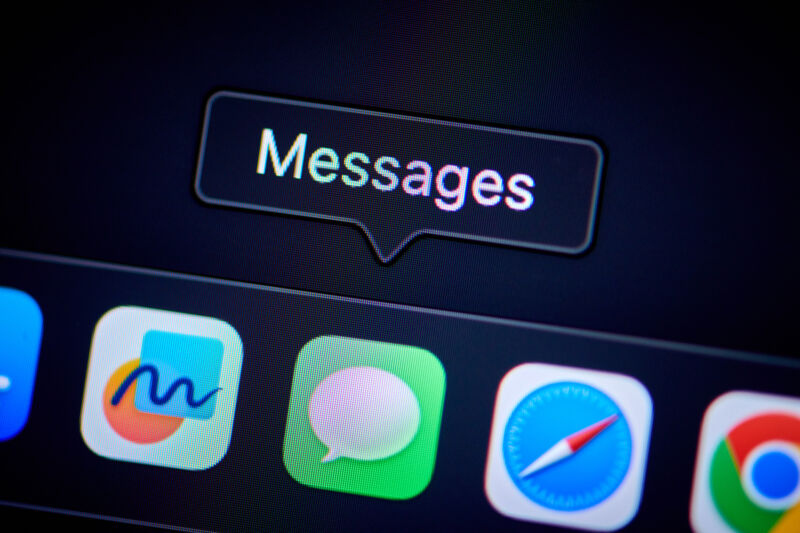
Getty Images
Apple’s iMessage service is not a “gatekeeper” prone to unfair business practices and will thus not be required under the Fair Markets Act to open up to messages, files, and video calls from other services, the European Commission announced earlier today.
Apple was one of many companies, including Google, Amazon, Alphabet (Google’s parent company), Meta, and Microsoft to have its “gatekeeper” status investigated by the European Union. The iMessage service did meet the definition of a “core platform,” serving at least 45 million EU users monthly and being controlled by a firm with at least 75 billion euros in market capitalization. But after “a thorough assessment of all arguments” during a five-month investigation, the Commission found that iMessage and Microsoft’s Bing search, Edge browser, and ad platform “do not qualify as gatekeeper services.” The unlikelihood of EU demands on iMessage was apparent in early December when Bloomberg reported that the service didn’t have enough sway with business users to demand more regulation.
Had the Commission ruled otherwise, Apple would have had until August to open its service. It would have been interesting to see how the company would have complied, given that it provides end-to-end encryption and registers senders based on information from their registered Apple devices.
Google had pushed the Commission to force Apple into “gatekeeper status,” part of Google’s larger campaign to make Apple treat Android users better when they trade SMS messages with iPhone users. While Apple has agreed to take up RCS, an upgraded form of carrier messaging with typing indicators and better image and video quality, it will not provide encryption for Android-to-iPhone SMS, nor remove the harsh green coloring that particularly resonates with younger users.
Apple is still obligated to comply with the Digital Markets Act’s other implications on its iOS operating system, its App Store, and its Safari browser. The European Union version of iOS 17.4, due in March, will offer “alternative app marketplaces,” or sideloading, along with the tools so that those other app stores can provide updates and other services. Browsers on iOS will also be able to use their own rendering engines rather than providing features only on top of mobile Safari rendering. Microsoft, among other firms, will make similar concessions in certain areas of Europe with Windows 11 and other products.
While it’s unlikely to result in the same kind of action, Brendan Carr, a commissioner at the Federal Communications Commission, said at a conference yesterday that the FCC “has a role to play” in investigating whether Apple’s blocking of the Beeper Mini app violated Part 14 rules regarding accessibility and usability. “I think the FCC should launch an investigation to look at whether Apple’s decision to degrade the Beeper Mini functionality… was a step that violated the FCC’s rules in Part 14,” Carr said at the State of the Net policy conference in Washington, DC.
Beeper Mini launched with the ability for Android users to send fully encrypted iMessage messages to Apple users, based on reverse-engineering of its protocol and registration. Days after its launch, Apple blocked its users and issued a statement saying that it was working to stop exploits and spam. The blocking and workarounds continued until Beeper announced that it was shifting its focus away from iMessage and back to being a multi-service chat app, minus one particular service. Beeper’s experience had previously garnered recognition from Senators Elizabeth Warren (D-Mass.) and Amy Klobuchar (D-Minn.).
Ars has reached out to Apple, Microsoft, and Google for comment and will update this post if we receive responses.

